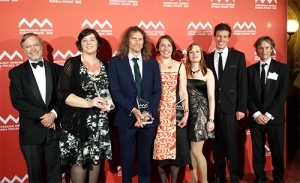Eureka award for Ecosystem Red List researchers
Research news
The IUCN Red List of Ecosystems team, led by Australian researchers, has received one of the nation’s most prestigious science awards - a 2015 Australian Museum Eureka Award. The Eureka’s are the “Logies” of the science world, celebrating Australia’s leading scientists and scientific breakthroughs.
Ecologist Dr Emily Nicholson, from Deakin’s School of Life and Environmental Sciences, and a member of the Centre for Integrative Ecology, was a key player in the Red List project, which has been adopted as the global standard to assessing risks to ecosystems by the International Union for the Conservation of Nature (IUCN).
She was “completely excited” to be with the team receiving the “NSW Office of Environment and Heritage” Eureka Prize for Environmental Research, presented at the Sydney Town Hall on 26 August.
“We have been working on this project for nearly 10 years, and we’re delighted that its huge value to conservation has been recognised by the Eureka’s,” she said.
Dr Nicholson explained that the Red List is set to have a major impact across the globe – providing a way of tracking whole ecosystems over time and identifying those most in need of attention. The list is already being used in Norway, and other countries are preparing to apply it, including China, Finland, Madagascar and Kenya.
“The Red List is the world’s first comprehensive and quantitative method for assessing ecosystems that can be applied globally to all ecosystems – marine, freshwater and terrestrial,” she said.
“Ecosystems are in decline around the world. Due to their diversity and the complex interconnections they contain, they are a real challenge to understand, analyse and protect. The Red List will be used globally by governments and scientists to stem biodiversity losses - across whole landscapes and seascapes.”
Dr Nicholson noted that the list provides rigorous methods for tracking the status of ecosystems through time and diagnosing the causes of decline, as well as helping scientists to identify the ecosystems that are most threatened and those that will benefit most through efforts to restore them.
“Healthy ecosystems are essential for our own quality of life. We depend on them for our economies, our food, water and clean air.”
Dr Nicholson was part of the core research team that has led the project, but said that it has been a huge team effort, involving over dozens of researchers around world, including Deakin’s own freshwater ecologist Dr Rebecca Lester and PhD student Matt Linn. Other project leaders were from the UNSW (including project leader Professor David Keith), the University of Melbourne, the NSW Office of Environment and Heritage, and the Arthur Rylah Institute for Environmental Research (Vic).
Originally from Melbourne, Emily Nicholson has had an exceptional early career that includes working as Research Fellow for such prestigious institutions as Imperial College London and Princeton University.
Now juggling career with three young children, she is enjoying the support of her extended family back in Melbourne, having joined Deakin in February as a Senior Lecturer in Quantitative Ecology.
Her work has focussed on forecasting change in biodiversity through scenario modelling, conservation planning, and global biodiversity policy. She led two key papers that influenced the Red List development, as well as co-authoring five papers on the Red List of Ecosystems.
The first, published in 2009, analysed how different countries approached ecosystem assessment, while the second, published earlier this year, reviewed ecosystem assessment methods within Australia and has been used to improve the consistency of listing ecosystems and ecological communities across the nation.
Deakin is funding an international strategic planning workshop that will be held on-campus in November to establish the next phase of the Red List project – devising a strategy to assess all of the world’s ecosystems over the next decade, including Australia’s.
This goal would have been unthinkable only a decade ago, considering there are over 500 different terrestrial ecosystems alone on each continent and hundreds more in the marine and freshwater realms. Technology, science and global momentum, however, are strong reasons for optimism that global efforts can make a difference to our future.
Share this story
 Prof Richard Kingsford (UNSW), Dr Tracey Regan (Arthur Rylah Institute), Prof David Keith (UNSW), Dr Emily Nicholson (Deakin), Dr Lucie Bland (Uni Melbourne), Dr Nick Murray (UNSW) and Dr Tony Auld (NSW Office of Environment and Heritage).
Prof Richard Kingsford (UNSW), Dr Tracey Regan (Arthur Rylah Institute), Prof David Keith (UNSW), Dr Emily Nicholson (Deakin), Dr Lucie Bland (Uni Melbourne), Dr Nick Murray (UNSW) and Dr Tony Auld (NSW Office of Environment and Heritage).
